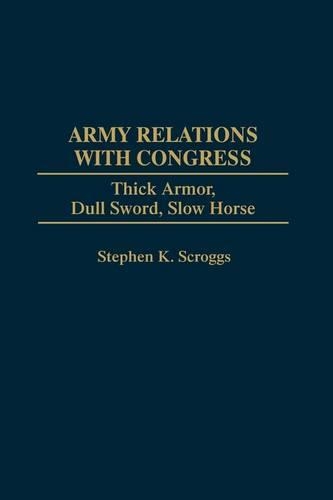
Army Relations with Congress: Thick Armor, Dull Sword, Slow Horse
(Hardback)
Available Formats
Publishing Details
Army Relations with Congress: Thick Armor, Dull Sword, Slow Horse
By (Author) Stephen K. Scroggs
Bloomsbury Publishing PLC
Praeger Publishers Inc
30th January 2000
United States
Classifications
Tertiary Education
Non Fiction
Land forces and warfare
322.50973
Physical Properties
Hardback
288
Description
Relying on extensive candid interviews from members of Congress and staff on defense authorization committees and senior Army general officers, Scroggs provides a strong insider analysis with recommendations. He examines the impact of culture on the varying abilities of public agencies, specifically the Army, to pursue its organizational interests through lobbying or liaising Congress. Scroggs argues that despite structural similarities in how the four military services approach Congress, differences in service culture affect their relative success in achieving their goals on the Hill. Scroggs draws four major conclusions. First, despite a law prohibiting lobbying of Congress by public agencies, Congress views lobbying or liaising by public entities, especially the military services, not only as a legitimate activity, but essential to Members carrying out their constitutional responsibilities. Second, relative to the other services, the Army is viewed by Congress as the least effective in its lobbying. Third, the Army's patterned approach with Congress is largely a function of its unrecognized and uncompensated culture in the unique terrain of the nation's capital. Fourth, because of the need for balanced service representation to Congress, relatively less effective Army efforts have troubling implications for national security and Army self-interest.
Reviews
"From Bunker Hill to San Juan Hill to Pork Chop Hill, America's Army has always fought with fervor...the exception has been Capitol Hill, where our Army has a long history of failing to make its case in the Battle of the Budget. Steve Scroggs incisively explains why this has been the case--and what might be done in the nation's interest to permit our Army's needs to be more effectively expressed in the halls of Washington."-Norman R. Augustine Former Under Secretary of the Army Chairman of the Executive Committee, Lockheed Martin Corporation
"In his insightful work, Scroggs analyzes the Army's challenges in representing its interests to Congress compared to its sister services. Scroggs makes a compelling case that the Army must consider two-way communication with Capitol Hill an essential mission because an active relationship with Congress is key to the Army's success."-Jack Reed, United States Senator (RI)
"In this thoughtful work, Scroggs eloquently lays out the Army's problems in representing its interests to Congress. A must read book for Army officers at all levels and anyone interested in national defense or congressional debate."-Robert W. RisCassi, General, U.S. Army (Ret.) Vice President, L-3 Communications Corporation
"Steve Scroggs reminds us that if the Army is to be manned, equipped, and trained for the challenges of the next century, the Army leadership must modernize its ability to convince the Congress of their needs. Much work is required in this area if we are to have the Army ready for the 21st century."-General (Ret.) Edward C. Meyer Chief of Staff U.S. Army
"The author illuminates an area of major importance: the Services' relations with Congress. The book should be required reading for all Army field grade officers."-Bernard W. Rogers, General, U.S. Army (Ret.) NATO's Supreme Allied Commander Europe, 1979-87
.,."provides an excellent description both of institutional culture and of a key problem in civil-military relations. The author also provides a useful analysis of how members of the executive branch of govenment can provide vital information to Congress without improperly pressuring legislators or violating the policies of the presidential administration. For all these reasons, this work will be rewarding reading from anyone interested in the relationship between the military forces and the federal government."-Forum for Applied Research and Public Policy
...provides an excellent description both of institutional culture and of a key problem in civil-military relations. The author also provides a useful analysis of how members of the executive branch of govenment can provide vital information to Congress without improperly pressuring legislators or violating the policies of the presidential administration. For all these reasons, this work will be rewarding reading from anyone interested in the relationship between the military forces and the federal government.-Forum for Applied Research and Public Policy
It is nonetheless an analysis that the new secretary of the army should read with care--and alarm.-Foreign Affairs
"It is nonetheless an analysis that the new secretary of the army should read with care--and alarm."-Foreign Affairs
..."provides an excellent description both of institutional culture and of a key problem in civil-military relations. The author also provides a useful analysis of how members of the executive branch of govenment can provide vital information to Congress without improperly pressuring legislators or violating the policies of the presidential administration. For all these reasons, this work will be rewarding reading from anyone interested in the relationship between the military forces and the federal government."-Forum for Applied Research and Public Policy
Author Bio
STEPHEN K. SCROGGS is Director of Investment, State of North Carolina Asia Office, North Carolina Department of Commerce./e Dr. Scroggs retired from the Army in 1996 after 20 years of service as a Lieutenant Colonel. During his military career, Colonel Scroggs served in both line and staff positions, including service as a congressional staff officer for the Secretary of the Army Legislative Liaison from 1992 to 1996.
